初中英语一般过去时将来时感叹句讲解及练习
(完整版)初中一般过去时详细讲解与练习
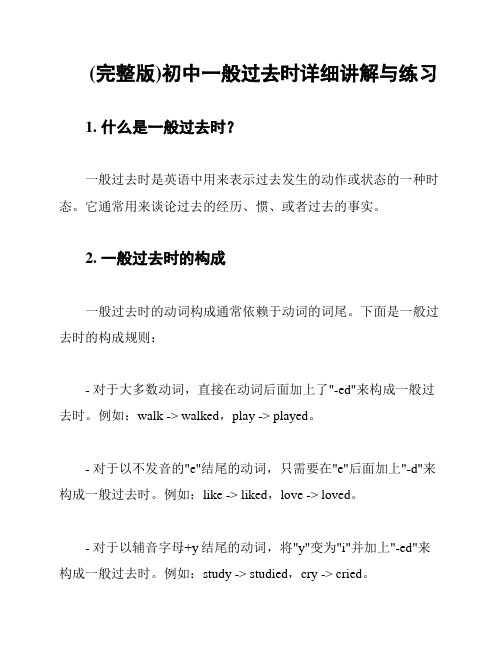
(完整版)初中一般过去时详细讲解与练习1. 什么是一般过去时?一般过去时是英语中用来表示过去发生的动作或状态的一种时态。
它通常用来谈论过去的经历、惯、或者过去的事实。
2. 一般过去时的构成一般过去时的动词构成通常依赖于动词的词尾。
下面是一般过去时的构成规则:- 对于大多数动词,直接在动词后面加上了"-ed"来构成一般过去时。
例如:walk -> walked,play -> played。
- 对于以不发音的"e"结尾的动词,只需要在"e"后面加上"-d"来构成一般过去时。
例如:like -> liked,love -> loved。
- 对于以辅音字母+y结尾的动词,将"y"变为"i"并加上"-ed"来构成一般过去时。
例如:study -> studied,cry -> cried。
- 部分动词的一般过去时需要进行不规则变化。
例如:go -> went,eat -> ate。
3. 一般过去时的用法一般过去时通常用来描述以下情况:- 过去发生的动作:I walked to school yesterday.- 过去的经历:He lived in London for five years.- 过去的事实:She was a teacher in the past.4. 一般过去时的句型练下面是一些练,帮助加深对一般过去时的理解和运用:1. 请用一般过去时填空:Yesterday, I ________ (watch) a movie at home.2. 完成句子:He _____ (visit) his grandparents last summer.3. 改写句子,使用一般过去时:I read a book yesterday. (改为否定句)4. 改写句子,使用一般过去时:They played basketball in the park. (改为疑问句)5. 总结一般过去时是用来表示过去发生的动作或状态的一种时态。
仁爱初中英语时态讲解及练习

1 _____you ____a doctor when you grow up?
A Will; going to be B Ar; be
2 I don’t know if his uncle _____. I think he _____ if it doesn’t
过去进行时常与过去某一特定时 间的状语连用,如 last night, at that time, at noon yesterday, last Sunday 等。 也有时没有时间状 语,要通过上下文的暗示来确定 用过去进行时。
1.I _____(cook, cooked, was cooking, were cooking) breakfast when you arrived. 2.What ____you_____( do, did, was...doing, were…doing) at this time yesterday evening? 3.We_____(have, are having, had, were having) dinner when the doorbell rang. 4.While/ When/ As we____( have, had, are having, were having) dinner, the doorbell rang.
时间状语:Tomorrow, next day(week, month, year…),soon, in a few minutes, by…,the day after tomorrow, etc.
否定形式:主语+am/is/are not going to do ; 主语+will/shall not do+其他 一般疑问句:be放于句首;will/shall提到句首。
感叹句和There be 句型知识点讲解与练习

感叹句和There be 句型的用法There be一、There be句型的概念There be表示某地(或某时)存在有某人(或某物),而并非某地(某人、某物或某时)拥有什么东西,其实质是倒装句。
There的意思“那里”,你不能翻译成“那儿是”,要翻译成“有”。
例句:There are some shoes near the bed。
正确翻译:在床旁边有些鞋子。
错误翻译:那儿是床边的一些鞋子。
二、There be句型的三种时态及句型结构:(一)三种时态①一般现在时: There is 和There are。
①一般过去时:There is——There was;There are——There were①一般将来时:There will be、There is/are going to be 翻译:将要有……(二)句型结构:一般疑问句①一般现在时和一般过去时一般疑问句:Is/Are/Was/Were+there+其他?肯定回答:Yes,there+is/are/was/were否定回答:No,there isn't/aren't/wasn't/weren't①一般将来时一般疑问句:Will there be+其他.肯定回答Yes,there will否定回答:No.there won't一般现在时和一般过去时否定形式①一般现在时和一般过去时在be动词后面加not.There isn't/aren't/wasn't/weren't +其他.isn't/aren't/wasn't/weren't的完整形式对应是is not,are not,was not 和were not①一般将来时的过去时的否定形式:There will not(won’t)be..........................特殊疑问句结构①表示数量的特殊疑问词(How many 或how much)+be+there+其他?How many对可数名词提问,可数名词在问句中必用复数。
初中英语语法-八种时态详解与练习
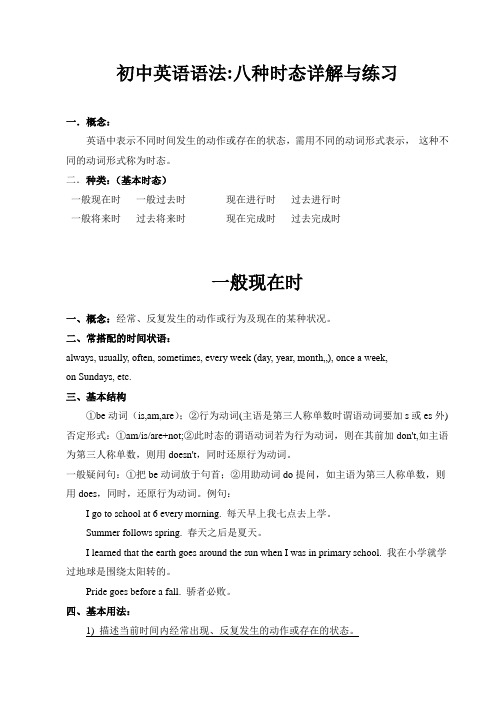
初中英语语法:八种时态详解与练习一.概念:英语中表示不同时间发生的动作或存在的状态,需用不同的动词形式表示,这种不同的动词形式称为时态。
二.种类:(基本时态)一般现在时一般过去时现在进行时过去进行时一般将来时过去将来时现在完成时过去完成时一般现在时一、概念:经常、反复发生的动作或行为及现在的某种状况。
二、常搭配的时间状语:always, usually, often, sometimes, every week (day, year, month…), once a week,on Sundays, etc.三、基本结构①be动词(is,am,are);②行为动词(主语是第三人称单数时谓语动词要加s或es外) 否定形式:①am/is/are+not;②此时态的谓语动词若为行为动词,则在其前加don't,如主语为第三人称单数,则用doesn't,同时还原行为动词。
一般疑问句:①把be动词放于句首;②用助动词do提问,如主语为第三人称单数,则用does,同时,还原行为动词。
例句:I go to school at 6 every morning. 每天早上我七点去上学。
Summer follows spring. 春天之后是夏天。
I learned that the earth goes around the sun when I was in primary school. 我在小学就学过地球是围绕太阳转的。
Pride goes before a fall. 骄者必败。
四、基本用法:1) 描述当前时间内经常出现、反复发生的动作或存在的状态。
在这种情景中,句子常带有表示频率的时间状语:always , everyday , often , once a week (month , year , etc.) , sometimes , seldom , usually等等,以表示句中的动作或状态是习惯性的、经常性的。
中考英语一般过去时和一般将来时经典例题解析
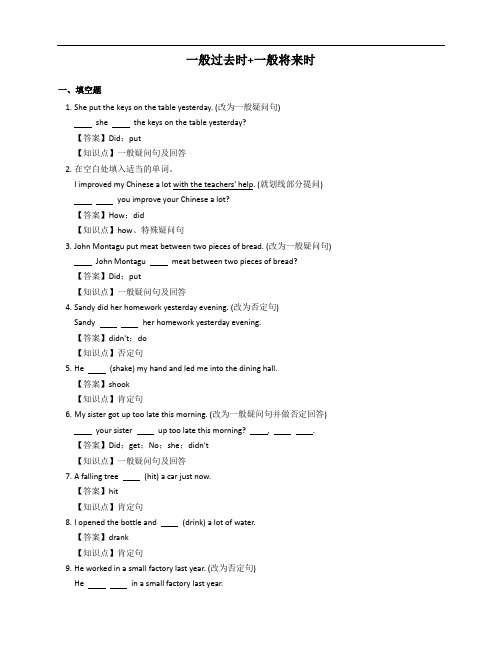
一般过去时+一般将来时一、填空题1.She put the keys on the table yesterday. (改为一般疑问句)she the keys on the table yesterday?【答案】Did;put【知识点】一般疑问句及回答2.在空白处填入适当的单词。
I improved my Chinese a lot with the teachers' help. (就划线部分提问)you improve your Chinese a lot?【答案】How;did【知识点】how、特殊疑问句3.John Montagu put meat between two pieces of bread. (改为一般疑问句)John Montagu meat between two pieces of bread?【答案】Did;put【知识点】一般疑问句及回答4.Sandy did her homework yesterday evening. (改为否定句)Sandy her homework yesterday evening.【答案】didn't;do【知识点】否定句5.He (shake) my hand and led me into the dining hall.【答案】shook【知识点】肯定句6.My sister got up too late this morning. (改为一般疑问句并做否定回答)your sister up too late this morning? , .【答案】Did;get;No;she;didn't【知识点】一般疑问句及回答7.A falling tree (hit) a car just now.【答案】hit【知识点】肯定句8.I opened the bottle and (drink) a lot of water.【答案】drank【知识点】肯定句9.He worked in a small factory last year. (改为否定句)He in a small factory last year.【答案】didn't;work【知识点】否定句10.A little bird (fly) in through the open window and she set it free at once.【答案】flew【知识点】肯定句11.Peter used to take risks when he was young. (改为一般疑问句)Peter to take risks when he was young?【答案】Did;use【解析】考查一般疑问句。
初中英语八大时态讲解及练习(全)
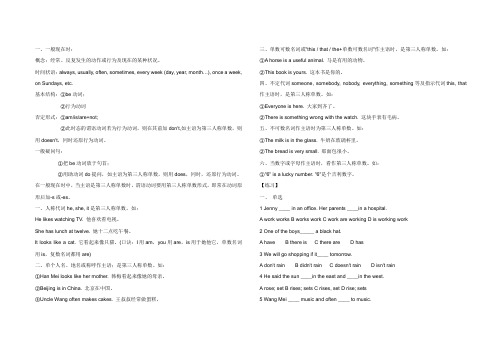
一、一般现在时:概念:经常、反复发生的动作或行为及现在的某种状况。
时间状语:always, usually, often, sometimes, every week (day, year, month…), once a week, on Sundays, etc.基本结构:①be动词;②行为动词否定形式:①am/is/are+not;②此时态的谓语动词若为行为动词,则在其前加don't,如主语为第三人称单数,则用doesn't,同时还原行为动词。
一般疑问句:①把be动词放于句首;②用助动词do提问,如主语为第三人称单数,则用does,同时,还原行为动词。
在一般现在时中,当主语是第三人称单数时,谓语动词要用第三人称单数形式,即常在动词原形后加-s或-es。
一、人称代词he, she, it是第三人称单数。
如:He likes watching TV. 他喜欢看电视。
She has lunch at twelve. 她十二点吃午餐。
It looks like a cat. 它看起来像只猫。
(口诀:I用am,you用are,is用于她他它,单数名词用is,复数名词都用are)二、单个人名、地名或称呼作主语;是第三人称单数。
如:①Han Mei looks like her mother. 韩梅看起来像她的母亲。
②Beijing is in China. 北京在中国。
③Uncle Wang often makes cakes. 王叔叔经常做蛋糕。
三、单数可数名词或"this / that / the+单数可数名词"作主语时,是第三人称单数。
如:①A horse is a useful animal. 马是有用的动物。
②This book is yours. 这本书是你的。
四、不定代词someone, somebody, nobody, everything, something等及指示代词this, that 作主语时,是第三人称单数。
初中英语一般过去时详解及练习题

一般过去时1.一般过去时表示在过去某一时间发生的动作或存在的状态表示时间的词有:yesterday,this morning/afternoon/evening,last+时间(上个...)last night,last Sunday,last week,last year2.一般过去时的基本结构肯定句式①主语+was/were+其他例句:He was here yesterday.②主语+动词过去式+其他例句:I went to play basketball last Sunday.否定句式①主语+was/were+not+其他例句:She wasn’t at home this morning.②主语+didn’t+动词原形+其他例句:I didn’t find you yesterday..一般疑问句①Was/Were+主语+其他例句:Were you at school last week?②Did+主语+动词原形+其他例句:Did you play football yesterday?特殊疑问句特殊疑问词(如what,why,when,where等)+一般疑问句句式例句:Where were you yesterday?What did you do yesterday?3.动词的过去式规则动词①一般情况下直接在动词后+ed例:work-worked look-looked walk-walked②以e结尾的单词直接+d例:live-lived hope-hoped use-used③以辅音字母+y结尾的,改y为i再+ed例:study-studied carry-carried以元音字母+y,直接+ed例:enjoy-enjoyed play-played⑤以重读、一个辅音字母结尾的闭音节结尾的动词,双写最后的辅音字母+ed例:stop-stopped plan-planned prefer-preferred不规则动词(书本76页表格)动词原形过去式动词原形过去式is/am was do didare were get gotbegin began go wentbuy bought have hadcome came make maderead read see sawrun ran take tookeat ate一般过去时练习题一、写出下列动词的过去式1.is/am_____2.fly_____3.plant_____4.are_____5.drink_____6.play_____7.go_____8.make_____9.do_____10.dance_____11.worry_____12.ask_____13.eat_____14.pass_____二、用所给动词的适当形式填空1.He_____(be)at home last night.2.He_____(visit)the Great Wall last year.3.We_____(have)a good time yesterday.4.We_____(go)to school by bus last year.5.Sam_____(did)the housework yesterday.6._____(do)you______(play)the violin this morning?三、选择题1.The two girls____all in Class1last year.A.areB.wasC.were.D is2.This morning he____a taxi.A.tookB.takesC.take.D is taking3.I_____to school at8o’clock yesterday.A.goB.am goingC.went D goes4.-What did you do last night?-I______a story bookA.readB.readedC.am reading D reads。
初中英语语法一般现在时、将来时、过去时讲解及练习题
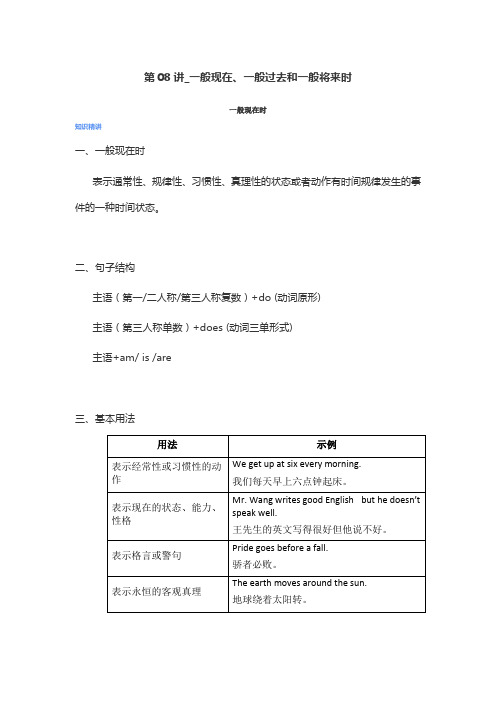
一般现在时知识精讲一、一般现在时表示通常性、规律性、习惯性、真理性的状态或者动作有时间规律发生的事件的一种时间状态。
二、句子结构主语(第一/二人称/第三人称复数)+do (动词原形)主语(第三人称单数)+does (动词三单形式)主语+am/ is /are三、基本用法四、时间状语1. 表示频率的副词: always, usually, often, sometimes, never, hardly, seldom…2. every/once+名词: every day/ week/ year, once a week/ month …3. 表示时间的短语: twice a day, on weekends, on Mondays…五、一般现在时动词三单的变化规律六、相关句式三点剖析一、考点:时态是英语学习中的核心内容之一,是英语学习的基础。
自然,时态考查是各种英语考试尤其是中考时的座上宾。
动作发生的时间决定时态,时态决定动词的形式,而考卷中的时态题通常没有给出明确的时间标志词,考试需领悟所提供的语境来做出判断。
只有推断出动作发出的正确时间,才可能正确答题,这就要求考生在熟练掌握时态结构、用法并牢记常用的时间状语的基础上,要充分利用上下文中隐含的信息来捕捉时间,找准答题的突破口。
二、重难点:一般现在时在考试中的重难点是:句子结构、基本用法、标志时间状语、动词三单的变化规则及相关句式的变化。
三、补充点:1. 表示按计划或安排好的,或将要发生的动作,可用一般现在时表将来。
但只限于start, begin, leave, go, come, arrive, return, take place等。
例:My train leaves at 7:00 this afternoon.我乘坐的火车将在今天下午7点离开。
2. 在复合句中,当主句是一般将来时,时间或条件状语从句的谓语动词只能用一般现在时来表示将来要发生的动作。
- 1、下载文档前请自行甄别文档内容的完整性,平台不提供额外的编辑、内容补充、找答案等附加服务。
- 2、"仅部分预览"的文档,不可在线预览部分如存在完整性等问题,可反馈申请退款(可完整预览的文档不适用该条件!)。
- 3、如文档侵犯您的权益,请联系客服反馈,我们会尽快为您处理(人工客服工作时间:9:00-18:30)。
第一讲My lifeMy school life is a lot of fun. I like studying in the classroom with my lovely classmates. We get on well with each other. We play sports and sing together. I often miss my classmates and teachers if I don’t see them for a long time. But sometimes our teachers give us too much homework. Parents and teachers often put great pressure on us.I wish a happy life in a big city in the future.I will live in a big house with a garden, and drive to work. I will travel a lot in my spare time.I’ll work hard so that I can go to a good university. Then I can get a good job in the future and my dream will come true.一般过去时一.概念动词一般过去时,表示过去发生的事,句子描述的动作发生在过去,到现在已经不存在。
二.标志与表示过去的一些时间状语连用1. yesterday或以其构成的短语:yesterday morning(afternoon, evening)等;2. 由“last+时间名词”构成的短语:last night, last year (winter, month, week)等;3. 由“时间段+ago”构成的短语:a moment ago, a short time ago, an hour ago等;4. 其它:just now等三.结构主语+动词的一般过去时(was/were/did)+其他否定句:若动词是be动词:主语+was/were not+其他若主语是其他实意动词:主语+did not/didn’t+ do+其他一般疑问句:Was/Were+主语+其他肯定回答用“Yes, 主语+was/were.”;否定回答用“No,主语+wasn't/weren't.Did +主语+do+其他肯定回答用“Yes, 主语+did.否定回答用“No,主语+did not /didn’t.特殊疑问句:特殊疑问词+一般疑问句练习:1、昨天我不在家翻译:否定:一般疑问句:回答:2、我生气地看着那对男女翻译:否定:一般疑问句:回答:四.专项练习1.单项选择1). My father______ill yesterday.A. isn't B. aren't C. wasn't D. weren't 2).____your parents at home last week﹖A. Is B. Was C. Are D. Were 3).The twins______in Dalian last year. They______here now.A.are; were B.were; are C.was; are D.were; was 4).__your father at work the day__yesterday(前天)﹖A.Was; before B.Is; before C.Was; after D.Is; after 5).—Who was on duty last Friday﹖—______.A. I am B. I was C. Yes, I was D. No, I wasn't 6). I cleaned my classroom ___________.A with three hoursB three hours agoC in three hoursD three hours before 7). I came _______ my house two days ago .A back onB back toC to backD back8). _____? He did some reading at home.A What does your father do yesterday eveningB What does your brother do in the schoolC What did your brother do over the weekendD Where did your brother go last Sunday9). What did you do ________ ? I went to the movies. A next morning Bover the weekendC in the weekendD next Monday10).The koala sleeps _______,but gets up _________.A .during the day; at the eveningB.at day ;during nightC.in the day ;during the eveningD.during the day;at night2.请用正确动词形式填空。
1). I _________ (have) an exciting party last weekend.2). _________ she _________(practice) her guitar yesterday? No, she _______.3). What ________ Tom ________ (do) on Saturday evening?He ________(watch) TV and __________(read) an interesting book.4). They all _________(go) to the mountains yesterday morning.5). She _________(not visit) her aunt last weekend. 6). When ________ you _________(write) this song? I __________(write) it last year.7). My friend, Carol, ______(study) for the math test and ____(practice) English last night.8). ____ Mr. Li _____(do) the project on Monday morning? Yes, he _____. 9). How ____(be) Jim's weekend? It ____(be not) bad. 10). _____ (be) your mother a sales assistant last year? No. she _______第二讲 一般将来时一、一般将来时的定义:-表:将来某一个时间将要发生的动作或存在的状态,也表示将来经常或重复发生的动作二表:将来某一个时间将要发生的动作或存在的状态,也表示将来经常或重复发生的动作. 二.一般将来时的标志:tomorrow(明天),the day after tomorrow(后天)next day(week, month, year…)(下一个天,星期,月,年) soon (不久) by…, in a few minutes, the day after tomorrow, 三.一般将来时的构成:1.主语+be(am,is,are) going to+动词原形+...... 例如:(1).I am going to play football tomorrow.明天我将要踢足球.2.主语+will/shall+动词原形+.....** ***说明:(1).will/shall 有时可以和be going to 互换; (2).will 是万能的,shall 只能用在第一人称,主语是I,we. (3).will 和shall 的后面接动词原形) 例如:(1).I shall/will go to Beijing next month.(I will=I'll)下个月我将要去北京.(2).You will come to see me tomorrow.(you will=you'll)明天你将要来看我.(3).She will read English tomorrow morning.(She will=She'll)明天早上她将要读英语. 四.一般将来时的句式:1.肯定句:(1)..主语+be(am,is,are) going to+动词原形+...... (2)..主语+will/shall+动词原形+..... 例句和上面一样,就不举了.2.否定句 :(1)..主语+be(am,is,are) not going to+动词原形+......例如: She is not/isn't going to visit Shanghai nextyear. 明年她不将参观上海.(2)..主语+will/shall not+动词原形+..... (A). I shall not go to school the day after tomorrow 。
后天我不将上学了(B). She will not see a movie next week.(will not=won't) 下个星期她将不看一场电影.3.一般疑问句:(1).Am/Is,Are+主语+going to+动词原形+.... 例如(A).Am I going to see my grandfather tomorrow?明天我将去看我的爷爷吗? --Yes,you are.是的,你将去. (B). Are you going to listening to the tape tomorrow?明天你将听录音带吗? ---No,I am not.不,我不将. (C). --Is she going to Beijing next year? 明年我将去北京吗? --Yes,she is. 是的,她将. (2).Will//shall+主语+动词原形+...例如 (A). Shall we play volleyball next class? 下一节课我们将打排球吗? --Yes,you will.是的,你们将. (B). Will you come here next week? 下个星期你将来这儿吗? --Yes,I will. 是的,我将. (C).--Will she teach us this term? 这学期,她将教我们吗? --Yes,she will. 是的,她将. 4.特殊疑问句:(1).What(Where,How...)+be(am,is,are)+主语+going to+动词原形+...?例如:(A).--What are you going to do tomorrow? 明天你将要做什么? --I'm going to the park? 我将要去动物园. (B).--Where are you going to swim? 你将要去哪儿游泳? --I'm going to swim in the river. (2). What(When,Where,How...)+主语+动词原形+...? 例如:(A). What will you do next week ? 下个星期你将要做什么? ---I will do my homework 。
